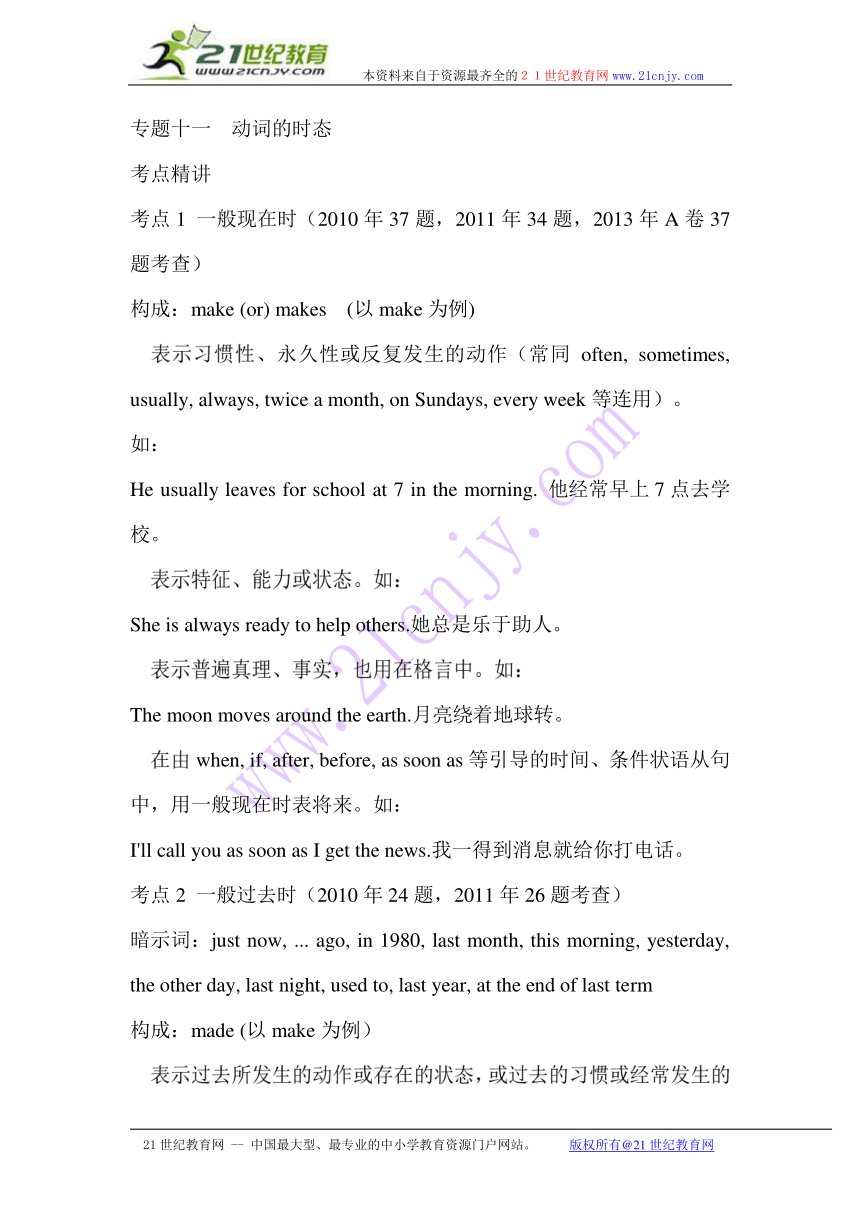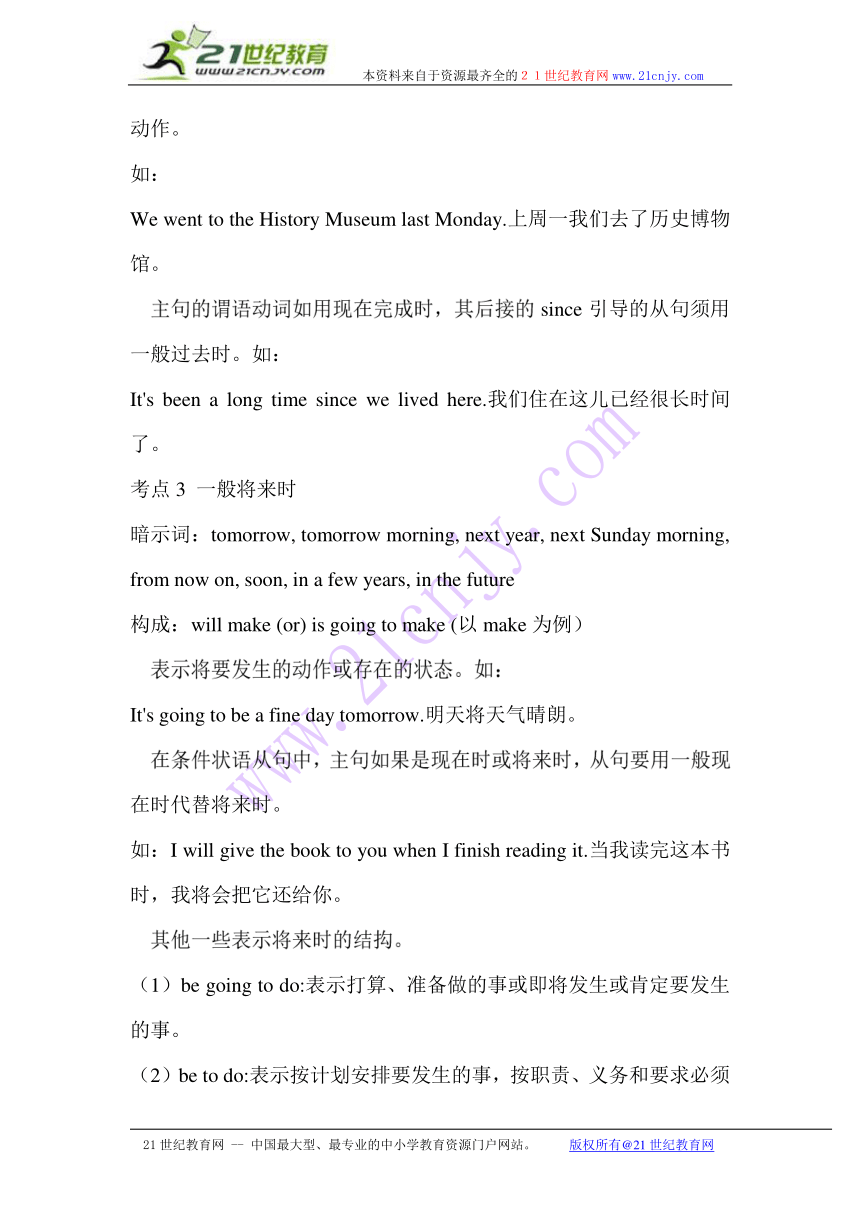2014届(仁爱湘教版)重庆市中考考点解密:【专题十一】动词的时态
文档属性
| 名称 | 2014届(仁爱湘教版)重庆市中考考点解密:【专题十一】动词的时态 |  | |
| 格式 | zip | ||
| 文件大小 | 13.1KB | ||
| 资源类型 | 教案 | ||
| 版本资源 | |||
| 科目 | 英语 | ||
| 更新时间 | 2014-04-23 09:05:39 | ||
图片预览


文档简介
专题十一 动词的时态
考点精讲
考点1 一般现在时(2010年37题,2011年34题,2013年A卷37题考查)
构成:make (or) makes (以make为例)
?表示习惯性、永久性或反复发生的动作(常同often, sometimes, usually, always, twice a month, on Sundays, every week等连用)。
如:
He usually leaves for school at 7 in the morning. 他经常早上7点去学校。21cnjy.com
?表示特征、能力或状态。如:
She is always ready to help others.她总是乐于助人。
?表示普遍真理、事实,也用在格言中。如:
The moon moves around the earth.月亮绕着地球转。
?在由when, if, after, before, as soon as等引导的时间、条件状语从句中,用一般现在时表将来。如:www-2-1-cnjy-com
I'll call you as soon as I get the news.我一得到消息就给你打电话。
考点2 一般过去时(2010年24题,2011年26题考查)
暗示词:just now, ... ago, in 1980, last month, this morning, yesterday, the other day, last night, used to, last year, at the end of last term
构成:made (以make为例)
?表示过去所发生的动作或存在的状态,或过去的习惯或经常发生的动作。
如:
We went to the History Museum last Monday.上周一我们去了历史博物馆。21教育网
?主句的谓语动词如用现在完成时,其后接的since引导的从句须用一般过去时。如:
It's been a long time since we lived here.我们住在这儿已经很长时间了。www.21-cn-jy.com
考点3 一般将来时
暗示词:tomorrow, tomorrow morning, next year, next Sunday morning, from now on, soon, in a few years, in the future2-1-c-n-j-y
构成:will make (or) is going to make (以make为例)
?表示将要发生的动作或存在的状态。如:
It's going to be a fine day tomorrow.明天将天气晴朗。
?在条件状语从句中,主句如果是现在时或将来时,从句要用一般现在时代替将来时。
如:I will give the book to you when I finish reading it.当我读完这本书时,我将会把它还给你。【出处:21教育名师】
?其他一些表示将来时的结抅。
(1)be going to do:表示打算、准备做的事或即将发生或肯定要发生的事。
(2)be to do:表示按计划安排要发生的事,按职责、义务和要求必须做的事或用来征求对方的意见。【版权所有:21教育】
(3)go, come, leave, start, begin, stay, do, take等用于一般现在时,表示按计划或时刻要发生的事。21教育名师原创作品
(4)be about to do:表示即将做某事。
考点4 现在进行时(2012年29题,2013年A卷31题考查)
暗示词:now, at present, at the moment, these days, look, listen
构成:am (or) is (or) are making (以make为例)
?表示现在或现阶段正在进行的动作或发生的事。
如:
The telephone is ringing. Could you answer it, please?电话正在响,你可以接听一下吗?21世纪教育网版权所有
?表示某个按最近计划或安排将要进行的动作。如:
I'm visiting Chongqing this week.这周我将参观重庆。
?come, go, leave, start, arrive, fly等表示位置移动的词可以用进行时表示最近计划要发生的动作。如:2·1·c·n·j·y
We are going to the park tomorrow.明天我们去公园。
考点5 过去进行时(2013年A卷27题考查)
暗示词:then, at that time, at this time yesterday, when, while
构成:was (or) were making(以make为例)
?表示过去某时刻或一段时间内正在进行的动作。
如:
I was reading when he came in.当他进来的时候,我正在读书。
?过去进行时,可以用来代替一般过去时;带有感彩,表示赞美、厌烦等情绪。如:
He was always complaining about something.他总是抱怨一些事情。
?表示从过去某个时间看出要发生的事(按计划或安排要进行的动作,往往没有一个表示未来时间的状语)。如:【来源:21·世纪·教育·网】
I asked him whether he was coming back for supper.我问他是否回来吃晚饭。21·世纪*教育网
考点6 现在完成时(2009年,2011年,2012年,2003B卷年均考查1次)
构成:have (or) has made(以make为例)
?到现在为止这一时期发生的情况;可能是多次动作的总和,也可表示状态或习惯性的动作。
如:He has been ill for three days.他已经病了三天了。
?对现在有影响的某一发生的动作。如:
Thank you, I've had my supper.谢谢你,我已经吃过晚饭了。
?already, yet, just, ever, never等副词即表示到现在为止这段时间的状语, 21*cnjy*com
如:up till now, so far, this week, recently, this morning等多与现在完成时连用。如:【来源:21cnj*y.co*m】
So far, they've only finished half the task.到目前为止,他们只完成了一半的任务。21·cn·jy·com
考点精讲
考点1 一般现在时(2010年37题,2011年34题,2013年A卷37题考查)
构成:make (or) makes (以make为例)
?表示习惯性、永久性或反复发生的动作(常同often, sometimes, usually, always, twice a month, on Sundays, every week等连用)。
如:
He usually leaves for school at 7 in the morning. 他经常早上7点去学校。21cnjy.com
?表示特征、能力或状态。如:
She is always ready to help others.她总是乐于助人。
?表示普遍真理、事实,也用在格言中。如:
The moon moves around the earth.月亮绕着地球转。
?在由when, if, after, before, as soon as等引导的时间、条件状语从句中,用一般现在时表将来。如:www-2-1-cnjy-com
I'll call you as soon as I get the news.我一得到消息就给你打电话。
考点2 一般过去时(2010年24题,2011年26题考查)
暗示词:just now, ... ago, in 1980, last month, this morning, yesterday, the other day, last night, used to, last year, at the end of last term
构成:made (以make为例)
?表示过去所发生的动作或存在的状态,或过去的习惯或经常发生的动作。
如:
We went to the History Museum last Monday.上周一我们去了历史博物馆。21教育网
?主句的谓语动词如用现在完成时,其后接的since引导的从句须用一般过去时。如:
It's been a long time since we lived here.我们住在这儿已经很长时间了。www.21-cn-jy.com
考点3 一般将来时
暗示词:tomorrow, tomorrow morning, next year, next Sunday morning, from now on, soon, in a few years, in the future2-1-c-n-j-y
构成:will make (or) is going to make (以make为例)
?表示将要发生的动作或存在的状态。如:
It's going to be a fine day tomorrow.明天将天气晴朗。
?在条件状语从句中,主句如果是现在时或将来时,从句要用一般现在时代替将来时。
如:I will give the book to you when I finish reading it.当我读完这本书时,我将会把它还给你。【出处:21教育名师】
?其他一些表示将来时的结抅。
(1)be going to do:表示打算、准备做的事或即将发生或肯定要发生的事。
(2)be to do:表示按计划安排要发生的事,按职责、义务和要求必须做的事或用来征求对方的意见。【版权所有:21教育】
(3)go, come, leave, start, begin, stay, do, take等用于一般现在时,表示按计划或时刻要发生的事。21教育名师原创作品
(4)be about to do:表示即将做某事。
考点4 现在进行时(2012年29题,2013年A卷31题考查)
暗示词:now, at present, at the moment, these days, look, listen
构成:am (or) is (or) are making (以make为例)
?表示现在或现阶段正在进行的动作或发生的事。
如:
The telephone is ringing. Could you answer it, please?电话正在响,你可以接听一下吗?21世纪教育网版权所有
?表示某个按最近计划或安排将要进行的动作。如:
I'm visiting Chongqing this week.这周我将参观重庆。
?come, go, leave, start, arrive, fly等表示位置移动的词可以用进行时表示最近计划要发生的动作。如:2·1·c·n·j·y
We are going to the park tomorrow.明天我们去公园。
考点5 过去进行时(2013年A卷27题考查)
暗示词:then, at that time, at this time yesterday, when, while
构成:was (or) were making(以make为例)
?表示过去某时刻或一段时间内正在进行的动作。
如:
I was reading when he came in.当他进来的时候,我正在读书。
?过去进行时,可以用来代替一般过去时;带有感彩,表示赞美、厌烦等情绪。如:
He was always complaining about something.他总是抱怨一些事情。
?表示从过去某个时间看出要发生的事(按计划或安排要进行的动作,往往没有一个表示未来时间的状语)。如:【来源:21·世纪·教育·网】
I asked him whether he was coming back for supper.我问他是否回来吃晚饭。21·世纪*教育网
考点6 现在完成时(2009年,2011年,2012年,2003B卷年均考查1次)
构成:have (or) has made(以make为例)
?到现在为止这一时期发生的情况;可能是多次动作的总和,也可表示状态或习惯性的动作。
如:He has been ill for three days.他已经病了三天了。
?对现在有影响的某一发生的动作。如:
Thank you, I've had my supper.谢谢你,我已经吃过晚饭了。
?already, yet, just, ever, never等副词即表示到现在为止这段时间的状语, 21*cnjy*com
如:up till now, so far, this week, recently, this morning等多与现在完成时连用。如:【来源:21cnj*y.co*m】
So far, they've only finished half the task.到目前为止,他们只完成了一半的任务。21·cn·jy·com
同课章节目录
- 词法
- 名词
- 动词和动词短语
- 动词语态
- 动词时态
- 助动词和情态动词
- 非谓语动词
- 冠词
- 代词
- 数词和量词
- 形容词副词及其比较等级
- 介词和介词短语
- 连词和感叹词
- 构词法
- 相似、相近词比较
- 句法
- 陈述句
- 一般疑问句和否定疑问句
- 特殊疑问句及选择疑问句
- 反意疑问句
- 存在句(There be句型)
- 宾语从句
- 定语从句
- 状语从句
- 主谓一致问题
- 简单句
- 并列句
- 复合句
- 主谓一致
- 主、表语从句
- 名词性从句
- 直接引语和间接引语
- 虚拟语气
- 感叹句
- 强调句
- 倒装句
- 祈使句
- 句子的成分
- 句子的分类
- 题型专区
- 单项选择部分
- 易错题
- 完形填空
- 阅读理解
- 词汇练习
- 听说训练
- 句型转换
- 补全对话
- 短文改错
- 翻译
- 书面表达
- 任务型阅读
- 语法填空
- 其他资料
